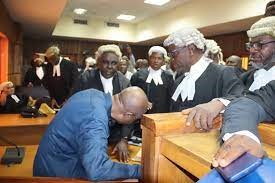The troubled former governor of the Central Bank of Nigeria (CBN), Mr. Godwin Emefiele, was placed under remand on Monday by Justice Rahman Oshodi of the Ikeja Special Offenses Court due to allegations of abusing his position.
Oshodi remanded Emefiele to the EFCC, while his co-defendant Henry Isioma-Omoile was placed in the Ikoyi Custodial Center. He is detained there until April 11, when their bail request is decided.
In his two bail requests, the defendant’s attorney, Mr. A. Labi-Lawal, asked the court to release the prisoner on liberal terms and with self-recognition while the case was being decided. In his 31 affidavits, Labi-Lawal claimed that Emiliele, the first defendant, had cooperated with Justice Muazu’s bail request in his ongoing fraud trial case.
He said the charges were bailable offences and not a capital offence. “Though the first defendant was granted administrative bail by the prosecuting authority.
“He is seeking bail based on self-recognition and he is ready to attend the court.
“The court should also take into consideration, the status of the first defendant, as he was the former CBN governor of the country,” he said. The defence counsel said his client had religiously presented himself before Justice Muazu in Abuja to answer the allegations before him.
According to him, the first defendant was not at flight risk, as he was the first person to arrive in court. He also prayed the court to release Emefiele to a lawyer, pending the determination of the bail. Emefiele and his co-defendant pleaded not guilty to the 26-count charge bordering on abuse of office, accepting gratification, accepting gifts through agents, corruption, and fraudulent property receipt.
The defendants, however, pleaded not guilty, following their arraignment. The EFCC counsel, Mr Rotimi Oyedepo (SAN), did not oppose the bail application moved by the defence counsel. Oyedepo, however, urged the court to exercise its discretion judiciously in granting bail to the defendants. The prosecution had asked the court for a trial date, following the plea of the defendants.













